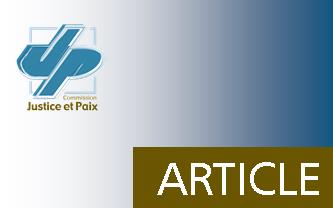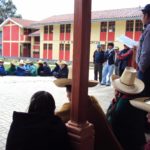This analysis looks at the issues around the global and Belgian contexts of development education and the way in which continuing education methods can allow the associative environment to maintain freedom of action and expression in relation to to the subsidizing power.
There
first analysis The challenges of development education looks at the vision developed around global conflicts and the way in which a Belgian association can approach them. As a development education NGO and continuing education association, Justice and Peace benefits from a dual identity which helps it to better fulfill its missions: observing and understanding conflict contexts, starting from the realities experienced in societies (from North and South), build alternatives with citizens. This double recognition by public funders represents complementarity in the service of action. This reflection, drawn from work experience resulting from our continuing education initiatives, aims to nourish reflection in the associative sector. For around ten years, the field of development cooperation has been the subject of in-depth international reflection. The successive
Declarations of Rome (2003), Paris (2005), Accra (2008) and Busan (2011) demonstrate a desire to adapt to an ever-changing context where the world is increasingly interdependent. At the basis of these gatherings, a question: how to transform aid partnerships into real forces for development? Five principles have thus been established as having to govern development aid strategies:
- Ownership: Developing countries define their own poverty reduction strategies, improve their institutions and fight corruption.
- Alignment: Donor countries align with these objectives and rely on local systems.
- Harmonization: Donor countries consult together, simplify procedures and share information to avoid duplication.
- Results: Developing countries focus on desired results and their assessment.
- Mutual Accountability: Donors and partners are responsible for development results.
As we can see, the central concern is therefore the search for the effectiveness of international aid. The European Union has translated these principles into a new cooperation policy (Agenda for change). Belgium, in turn, is following the evolution of the international context by reforming the structure of the Directorate General for Cooperation and by developing its relations with the actors it finances, including NGOs. This new vision, if it seeks greater coherence (among other beneficial effects expected from this reform, note that it could encourage the different actors to more consultation and collaboration), involves risks noted by the sector: among others the loss of diversity and therefore of the wealth of the sector as well as its autonomy. Indeed, in our eyes, associative diversity, and therefore the survival of small associations, can be synonymous with creativity, responsiveness and adaptability: the decision-making chain of a small organization is often adapted to its size and allows you to respond more easily and quickly to current events. Furthermore, the limited number of team members makes it easier to manage the tendency of “resistance to change” and thus adapt to changing societal contexts. The “screening” of the sector, which can be seen as a preliminary step to a new reform of the sector, will aim to judge the professionalism of NGOs and therefore the legitimacy of their access to financing. By controlling criteria such as financial management or human resources, for example, do we not risk leaving behind a series of “small” NGOs? Does the “screening” of the development cooperation sector not risk leaving aside a series of “small” NGOs, and thereby losing diversity and associative richness? The tendency of governmental cooperation to reduce the list determining
partner countries de facto requires the sector to follow its priority line on so-called fragile countries and post-conflict zones. For example, the removal of Peru from the list of partner countries of Belgium will imply a reduction not only in aid (project financing) but also risks leading to a reduction in inter-association collaborations between our two countries. However, as we said in a
previous analysis , although Peru's macroeconomic criteria place it as a Middle Income Country (MIC), it deserves continued international attention, if only in view of its strong economic inequalities and numerous social conflicts which are rife there. This example illustrates the loss of autonomy that the sector could experience. We are therefore entitled to ask ourselves whether, ultimately, the sector does not run the risk of being exploited. Indeed, by restricting access to financing and by creating modalities close to the call for tender (which is planned), does the Belgian Cooperation not risk carrying out, on the ground, projects with its own priorities, thus imposing its vision? It is important that the associative world continues to reflect and position itself on this subject and to challenge, with all its freedom of expression, the competent administrations. Because the coherence of development policies is a common challenge and the association's missions are, on the one hand, to identify inconsistencies between political speeches and the actions taken and, on the other hand, to formulate recommendations. In this regard, we salute the work carried out by the associations and federations such as the CNCD and Acodev. Finally, the power of action of associations in the development sector also lies in maintaining certain fundamental criteria, such as dialogue and consultation with partners and citizens. To establish trust, cooperative relationships with local partners must be lasting. However, the vagaries of political life imply de facto instability... priorities change depending on the Minister in place.
Praise of participation Faced with this changing context, the methodology of continuing education represents, in our eyes, real added value: working on changes in the collective and individual behavior of citizens must start from dialogue between the different stakeholders, raising awareness among stakeholders through exchange and debate, respect for points of view, sharing a vision of the common good that is not imposed but is built in consultation. Indeed, a standard regulating one or another aspect of life in society is all the more relevant and credible if it is based on the support of the parties concerned. In this sense, we see raising awareness of a fairer world as a process of supporting the public which leads to their action in favor of change towards a fairer world, in peace, and a model of cooperative and sustainable development. The traditional approach of “seeing”, “judging” and “acting” therefore translates into a desire to start from concrete realities, provide reading keys, reflect with our partners and audiences and encourage action and the construction of 'alternatives. Using the example of the theme of natural resource management in the world (which is one of the priorities of the Justice and Peace work plan in Belgian Cooperation), we show here how the constant interaction between the areas of Continuing education and development have helped to fuel our citizen awareness and political questioning efforts:
**Putting priority on participation and inclusion: the example of participatory democratic models
Des modèles démocratiques participatifs (complétant des modèles démocratiques en voie de consolidation) existent dans les pays du Sud ! Nous voulons promouvoir l’existence de mécanismes participatifs issus des contextes géographiques divers. Ainsi, l’existence et le fonctionnement des rondes paysannes au Pérou ou les assemblées des peuples en Amérique latine) démontrent que plus d’engagement citoyen est possible.
**Adapting to realities on the ground: the example of taking into account women as agents of change
The demands of Southern associations for a “gendered” reading to be taken into account perfectly illustrate the added value brought by those who are affected by our actions. If the role of women in matters of social cohesion and the production of wealth at the local level no longer needs to be demonstrated today, it is clear that the implications of the exploitation of natural resources on the situation of women and young girls are far from negligible in terms of economic and physical violence (particularly sexual) against them in areas of exploitation. In addition, they are generally deprived of power and control over natural resources, the ownership and management of which generally falls to men. This is why the activities and messages delivered by the development cooperation sector must reflect not only the role of "victim" of women, but also their experience and concerns in terms of natural resource management, with a view to support the realization of their individual and collective rights: Women in the South are true “pivots” of the domestic and community economy.
**Start from the experiences of our audiences: the example of the European citizen, consumer actor?
It is necessary to support citizen reflection and action on our consumption of natural resources and on the alternatives that exist or are to be developed: taking into account energy costs in the transformation of fossil fuels; investment in renewable energy; support for technological advances based on responsible and sustainable alternative economic systems (based on recovery and changes in production logic, etc.). Ultimately, it is our entire system of perception of values which must evolve with the use of indicators other than GDP to evaluate the development of our societies, in the North as in the South and achieve a balance between growth, social well-being and respect for the environment. These three methodological priorities imply that we are in a logic, not only of efficiency and achievement of quantified results, but also of respect for all stakeholders and the time which is necessary for them to journey with us. Between "top-down" and "bottom up", between "effectiveness of achieving a result" and "respect for the time necessary for the process", we believe that a balance can be found to respect both the necessary accountability to donors and the principle of interaction, sources of wealth and common work. As relevant and consistent as they may be, the rules laid down by donors must be exceeded. Because what must continue to inspire and guide the associative world is what the grassroots think and say. This text is part of a voluntary collective approach which brought together several organizations active in the Continuing Education sector. These associations (Cefoc, Center Avec, CESEP, Couples and Families, Justice and Peace, Media Animation, Pax Christi, SAW-B, Ufapec) have defined a theme on which to work collectively. To know : the counter-power role of associations and associative autonomy. Based on its roots and fields of action, each association has produced an analysis which reflects its point of view on this theme. The process started will be continued by a debate between them and with the readers. The other analyzes produced in this framework can be read by following these links: Continuing education in tension, by CEFOC: http://www.cefoc.be/L-Education-permanente-en-tensions Between freedom and dependence, the media on the wire, by Média-Animation: http://www.media-animation.be/Entre-liberte-et-dependance-les.html And if continuing education disappeared, by the Center Avec: www.centreavec. site/Et-si-l-education-permanente-disappearait Associations as resistance and response to neoliberalism: http://www.saw-b.be/spip/IMG/pdf/a1512_associationisme.pdf
Axelle Fischer
Attachments







